|
|
Chapter Thirteen: Times Are Changing (1985)
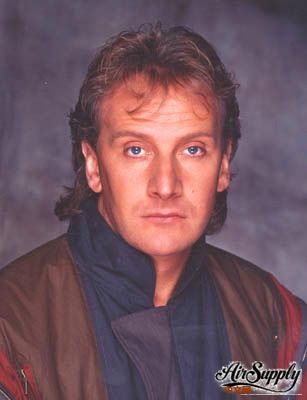
U.K. Photo Shoot
Air Supply spent the first few months of 1985 completing the new record, which would become the band’s second self-titled album. It was not their intention to release a second eponymous album, but they could not agree on a suitable title. After much debate, the band figured that since they were starting a new chapter in their careers, a self-titled album would portray a new and fresh beginning. “We made the decision after the ‘Greatest Hits’ album was released,” said Russell, “that it was the end of a section of Air Supply’s career. We were concerned that the next [album] would probably be the most important one.” According to Russell, Air Supply planned to release the album in the second half of 1983, but an “unexpectedly profitable ‘Greatest Hits’ tour delayed it by six months.” The disappointing results from the Montserrat sessions delayed it further. To help pull the album together, Arista hired two producers: Peter Collins and Bob Ezrin.
Air Supply recorded with Peter Collins in London, England, in December, 1984. Collins, a slight, bearded 34-year-old from Redding, England, was known for his meticulous production and heavily synthesized sound. He had turned out hit tunes for Tracey Ullman and Nik Kershaw, and was mainly responsible for giving Air Supply a distinctly European pop edge. “We told [Peter Collins] we wanted to get away from the big production of the past, and make the songs as contemporary as possible,” said Russell. “He’s very aggressive in his approach, and I think they’re the best-sounding tracks we’ve ever cut. The idea of two producers was to move the group ahead, but not to freak people too much. I don’t think the English-sounding stuff is too radical, and we have more of the traditional Air Supply.”

The other half of the album was recorded in Los Angeles and Toronto, and was produced by Bob Ezrin. Ezrin, an established Canadian music producer, created a name for himself after producing many of the early Pink Floyd and Alice Cooper albums. Unlike the songs recorded in England, the Ezrin produced tracks would be recognized as classic Air Supply, and would satisfy the existing fan base. “We were cautious not to change direction completely,” said Graham. “That’s why half the album has the type of sound people are used to hearing from us. But my favourite tracks are the ones cut in England.”
Bob Ezrin had a unique ability to bring out the best in a band. Before producing a record, he went to great lengths to understand the strengths and weaknesses of who he was working with. “The key is to pay attention,” said Ezrin. “Go to some shows, listen to some demos, and listen to their albums, and somewhere in all that you will hear moments of brilliance. You kind of have an invisible meter in your head, like an applause meter, that goes up when you hear certain levels of excellence. And when you hear those magical moments, or see those magical moments, the applause meter goes all the way up to a nine, and you say, ‘That’s it. That is what they are capable of, and nothing short of that will be acceptable for the project we’re about to do.’”
The sound of the new album was shaping up to have more ‘muscle’ than previous efforts, thanks to stronger drumming from Ralph Cooper and basslines by Don Cromwell. This was evident in the band’s own press release titled, ‘Tough Talk From Air Supply.’ “We are not intending to make a radical image change,” said Russell. “But I think some people might be surprised when they hear our new album. It’s synthesizer-based and more high-tech than our previous work. We wanted to retain our trademark sound, while incorporating a distinct modern edge. I think people that have enjoyed the stuff before will really love it, and hopefully with some of the new sounds on it, we might even broaden our audience.” Graham adds, “It’s something we’ve been wanting to do, and working towards for two years now. We had to get our direction changed for ourselves. These new songs sound terrifically up-to-date. They have a sharp high-tech sound, and what an education it was recording over there [in England]. It was pretty frightening at first working with all the computers and digital equipment.”
The lead single, ‘Just As I Am,’ was released in May, and was accompanied with a flashy video shot at the Sunrise Musical Theatre in Fort Lauderdale. The video brought together some of the most talented producers in television. It was directed by John Hopson, who also directed such videos as Hall & Oates’ ‘Method of Modern Love’ and ‘Out of Touch.’ The director of photography of the concert footage was Daniel Pearl, who also did the concert footage on the Cars’ ‘Drive’ and Duran Duran’s ‘The Reflex’ videos. The director of photography for the documentary scenes was Jimmy Contner, who was responsible for NBC’s Miami Vice.
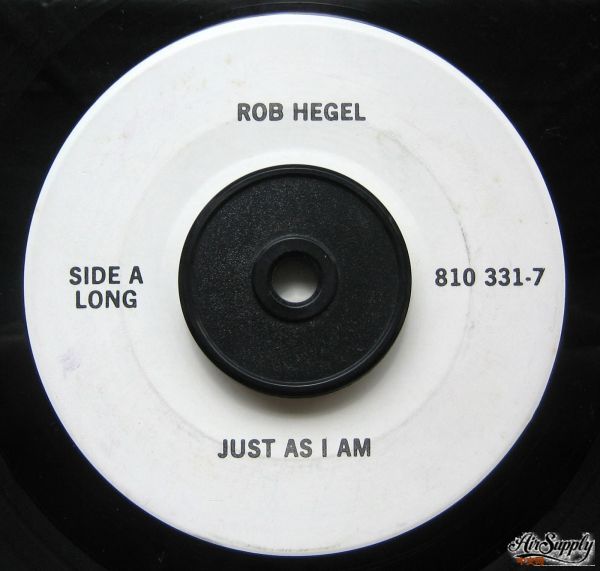
'Just As I Am' Promo Single - Rob Hegel
‘Just As I Am’ was written by Rob Hegel and Dick Wagner, and was first released by Hegel as a single with Mercury Records. It had limited success on radio because on the day of its release everyone in the A&R and promotions department at Polydor/Mercury was fired. “My girlfriend at the time was working at a management company and Dick Wagner was one of their clients,” said Rob Hegel. “He and I expressed interest in meeting each other and that meeting led to ‘Hey, let’s write a song.’ He came over to my apartment at 86th and Madison and I played him a melody I was working on - the verse and chorus of what would become ‘Just As I Am.’ Dick added the transition between the two (the ‘I’m not easy to understand’), and we had it done that night. We recorded it for Mercury Records and it was released in January of 1982. Needles to say, [after the staff at Mercury was let go], Dick and I knew our recording would probably end up in the lost and not found department. It did get a little airplay, but nothing to hang a hat on. Dave Carpin (A&R at Arista) heard the record and took it to Clive Davis. Clive knew me from prior dealings with [my publisher] Don Kirshner, and from my RCA recording ‘Tommy, Judy & Me,’ which he loved and thought I should rewrite to make it less controversial. He gave ‘Just As I Am’ to Air Supply, and told them it was going to be their follow-up single to ‘Making Love Out Of Nothing At All.’ Having just had their biggest single to date, and a number of Top 5 singles, Graham and Russell balked at the idea of being told what they would record, so they refused for two years. Clive eventually won out, but the music scene was changing. Air Supply had not been heard of for two years, and the song was their last Top 20 release. I liked their version (though I thought it was a bit loud compared to the way I had recorded the ballad), and it became the video of the year of VH-1. I thought that was cool.”
Legendary guitarist Dick Wagner, who had done studio work with Kiss, Alice Cooper and Aerosmith, performed all seven tracks of guitars on ‘Just As I Am.’ “Clive Davis had graciously allowed me to submit the occasional song including, ‘Just As I Am,’ a song I had written with Rob Hegel,” said Wagner. “I had submitted the song to Clive three years earlier, before he found a place for it. I was on the phone with Bob Ezrin, and he says that he is producing Air Supply, and ‘Clive Davis wants us to do a song that I don’t particularly want to do because I don’t like it. Air Supply hate it, and they want nothing to do with it because they only want to do their own material. But Clive insists that it’s a smash and we have to do it.’ So I asked him what was the name of the song? And he says, ‘Just As I Am.’ I told him that it was my song! Suddenly Bob said, ‘OK, then I LOVE the song!’ So he invited me to come up to Toronto to record the guitars.”
‘Just As I Am’ quickly gained airplay around the world, and it looked as if Air Supply would once again dominate the pop charts. In June, following the release of the new album, ‘Just As I Am’ reached #19 on Billboard, and remained on the chart for 15 weeks. This would be the highest chart position that Air Supply obtained in the U.S. in the years ahead. ‘Just As I Am’ did slightly better in Canada, peaking at #10. The flip-side of ‘Just As I Am’ contained the song ‘Crazy Love,’ which was advertised as a ‘special bonus track available only on this record.’ ‘Crazy Love’ was much admired by Air Supply fans, and requests to have it released on CD continue to this day.
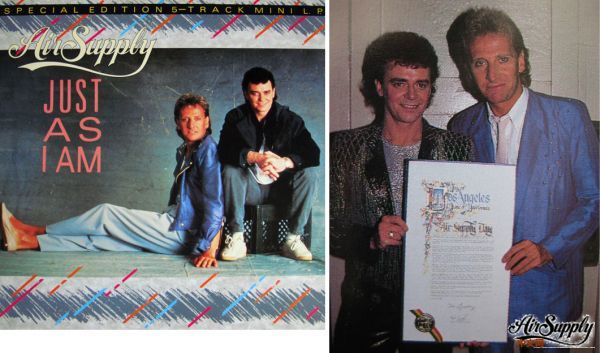
U.K. Mini LP May 18 - Air Supply Day
Arista released ‘Just As I Am’ in the U.K. as a unique 5-song mini-LP to help promote the new single and forthcoming album. Mini-LPs became popular in the early 80s with record companies who targeted customers who were reluctant to pay full-price for full-albums. The ‘Just As I Am’ 12" mini-LP included the songs ‘Crazy Love,’ ‘Lost In Love,’ ‘All Out Of Love’ and ‘Even The Nights Are Better.’
On May 18, the mayor of Los Angeles, Tom Bradley, declared it ‘Air Supply Day.’ Graham and Russell were presented with a certificate to commemorate the occasion, and some radio stations played Air Supply music for 24 hours straight.
The 1985 World ‘Power of Love Tour’ began in early March in Sydney, Australia. On stage, the band’s new image was clearly evident, as Graham and Russell performed in flashy outfits, with more glitter than previous years. Russell wore a black spangled jacket, while Graham wore a salmon coloured suit. Russell had lost weight, and was flashing a new smile after having significant dental work done. The new stage show featured plenty of fog, and an elaborate light show, operated by lead lighting technician Chris Taylor. “We have new lights called Vari-Lites,” said Russell. “They’re very versatile and very mobile, so there are some beautiful effects with those, but the staging is a lot simpler than it has been in the past. Because the show is not as overwhelming, the emphasis is back onstage with the musicians, and I can say people are listening more than they have been.” Since the tour started, Russell said he had noticed that the audiences were changing. “The audiences have grown up, and they are a lot older now than they used to be. But still, it has always been more into the middle of the road market. Hopefully, people who are interested in a little harder music will give us a listen.”
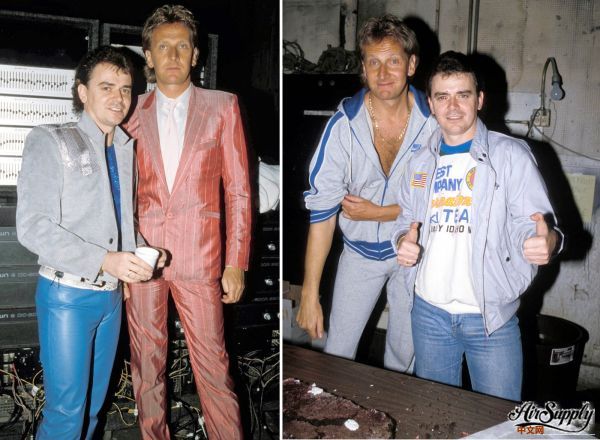
Before heading back to America, Air Supply performed on the Hawaiian Tropic-sponsored pageant The Most Beautiful Girl in the World in Sydney. They sang, ‘I Wanna Hold You Tonight’ and ‘Every Woman In The World,’ beside the Archibald Fountain in Sydney‘s Hyde Park, while the girls in the competition danced in the background. The pageant was broadcast worldwide.
Air Supply entered into a partnership with newly formed music channel VH-1: Video Hits One. The deal included full sponsorship of Air Supply’s North American tour. VH-1 was owned by MTV, and its content targeted an older audience, the 18 to 35 year old. While MTV ignored Air Supply for years, its new sister channel aired adult-friendly music videos like Barry Manilow, Lionel Richie, Elton John and Air Supply.
Don Arden felt the VH-1 partnership, unlike the 1983 Jordache deal that favoured the company, would benefit the artist as much as it does the corporation. “I don’t think they bring the groups anything at all, other than the money,” said Arden. “It does the product a lot of good, but it can’t help the group’s career in any shape or form.” Arden would not say how much money Jordache paid Air Supply, but he implied it was not close to what the most popular artists were getting for sponsorships at the time. “Naturally, if a Lionel Richie or a Michael Jackson can get $8 to $10 million from Pepsi, they’re not going to bother whether it does their career any good or not.”
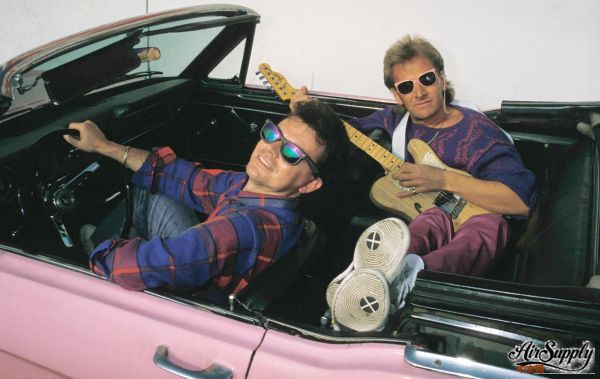
Nonetheless, the deal with VH-1 was very lucrative for Air Supply. The music channel agreed to pay the band what Arden characterized as “a lot of money.” In addition, VH-1 was in a unique position to market the band, and provide considerable exposure on their 24-hour music program. The deal stipulated that VH-1 would air eight spots a day, advertising the venues that Air Supply was performing in that week, in addition to airing the video of the band’s single, ‘Just As I Am.’ This certainly played a role when ‘Just As I Am’ won the VH-1 award for Music Video of the Year, based on the cable outlet’s 1985 viewer’s poll and the number of times the video aired. VH-1 also agreed to have station VJs make local appearances at selected concert dates, and to feature Air Supply regularly in interview segments. Arden was sure the new partnership would mean more records sold for Air Supply. When VH-1 launched in January of 1985, sales of the ‘Greatest Hits’ album experienced a resurgence. “I think this is going to help sell an extra million records,” said Arden. “[VH-1] played ‘Making Love Out Of Nothing At All’ every hour. As a result, we did about 200,000 albums in four months.”
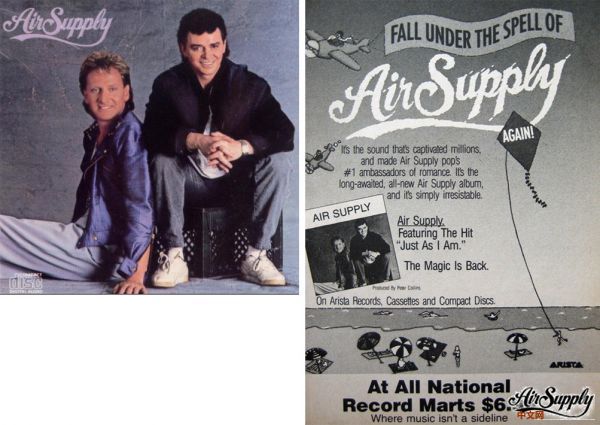
In June 1985, Air Supply was in the middle of a lengthy tour in support of their new album. Released on June 1, the album sold 600,000 copies in the first two weeks. Thousands of copies were sold through Columbia Record Club, which was made possible after Clive Davis negotiated a deal with Columbia Records for the rights to sell music by Arista’s artists in the successful record club. Shortly after its release, Air Supply’s album was the featured Columbia Record Club Soft Rock & Pop selection of the month.
Air Supply had hoped to release the new album before the start of the summer tour, but according to Russell, “political rubbish” between the record company and the group caused a delay. The release date was pushed back because Clive Davis insisted on making last minute changes, which Air Supply believed were not necessary. When Bob Ezrin delivered the finished album to Arista it did not include ‘Just As I Am.’ Clive Davis was livid, and refused to accept the album. He forced Ezrin to take Air Supply back into the studio in Toronto, Canada, to record ‘Just As I Am,’ which he still believed would be a huge hit.
“At the time they were [Clive’s] number-one group,” said Don Arden. “It all began to turn sour between us, though, when the band were making what should have been their biggest album yet. Clive wanted to dictate how the record should sound to Bob Ezrin, the producer. I’d listened to Ezrin’s mix and was happy with it; it sounded great. But Clive wasn’t satisfied and had the album remixed. Clive had a lot success over the years, but in my opinion he’d ruined the new album of one of my best-selling groups. When I found out, I was close to murdering him. I stormed into his office and told him what I thought of him in front of his whole staff.”
The ‘Power of Love Tour’ was extended into November, making it another long and grueling tour. Russell wanted to pursue solo projects when the tour was over, and Graham wanted to write film scores. But Arista hoped to start recording another Air Supply album before the end of the year. “It’s a pretty strange lifestyle,” admits Russell. “You go from a Ramada Inn to a taco stand and onto the next Holiday Inn. It’s definitely a form of insanity. You have to be prepared for overnight drives, less than desirable cuisine and plenty of physical exertion. And when you get off the road, it’s a bizarre experience. For the first two weeks, you can’t even sleep. And then you want to go out on tour again. But we ultimately deal with the drawbacks, because we’re addicted to the stage and performing to our fans. I really do believe now that the people who enjoy us play will be just as interested in what we do individually. I just don’t want people to think, ‘Oh, this is the end of Air Supply,’ because we are going to keep doing this because it’s our first love.”
Music critics applauded Air Supply for experimenting with new sounds during the tour of 1985. The 16-song set list clipped through old - ‘Lost In Love,’ ‘Here I Am,’ ‘Even The Nights Are Better,’ ‘The One That You Love,’ ‘All Out Of Love,’ ‘Making Love Out Of Nothing At All,’ and ‘Sweet Dreams,’ - and new, ‘Just As I Am,’ ‘I Can’t Let Go,’ ‘Black and Blue’ and ‘I Wanna Hold You Tonight,’ from the group’s newest album.
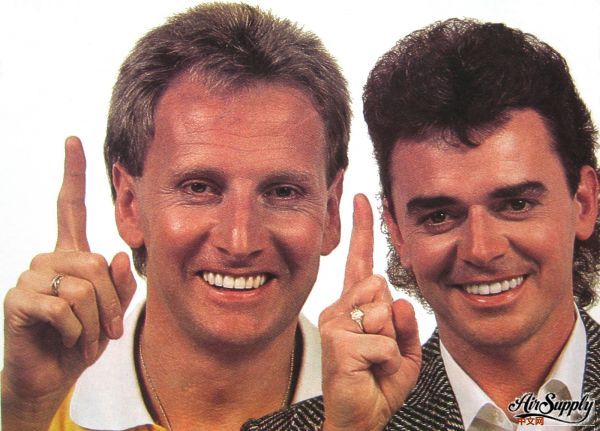
Air Supply demonstrated they can take things up a notch, if they want to. ‘I Can’t Stay Away,’ a rocker written by the group’s bassist, Donald Cromwell, brought a few folks into the aisle for a little Air Supply get-down-and-boogie. An explosive rendition of the dramatic ‘Making Love Out Of Nothing At All’ featured Hitchcock demonstrating more aptly his vocal range, drummer Ralph Cooper underscoring with a pounding rhythm, lead guitarist Wally Stocker (doing his Keith Richards imitation with dangling cigarette and a bottle on the side) getting a rare chance to sizzle, and the rest of the band bringing it all home. - Syracuse Herald
Although the ballad approach remains the heart of the new album, the set is well-balanced and the vocals of Graham Russell and Russell Hitchcock seem to pack some emotion, and the full orchestral backup helps. You’ve probably heard the first single on the radio. However, ‘Power Of Love,’ ‘Make It Right’ and ‘Sunset’ are equally as strong. There are a few songs that are on the uptempo side, but sound out of place. Overall, the new LP is superb. - Jack Kegg, Cumberland Sunday Times
With the newly released ‘Air Supply,’ these exponents of adult-oriented pop have beefed up their usual sugar-coated sound on such numbers as ‘Black and Blue,’ ‘After All’ and ‘I Wanna Hold You Tonight,’ and the tougher edge might even win them a new crop of fans from the youth market. - Anonymous critic
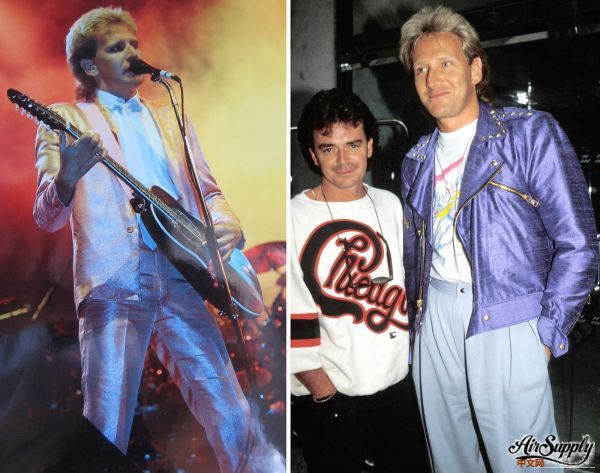
Most of the new songs were well received, with the one exception being the cover of Bruce Springsteen’s 1973 hit ‘Sandy.’ Originally titled ‘4th of July, Asbury Park (Sandy),’ Air Supply recorded the song on the advice of Clive Davis. Neither Graham or Russell liked the song, but Clive insisted it be included as one of his three selections. He told Air Supply that if they did not record ‘Sandy’ the entire album would not see the light of day. “I was surprised,” said Russell. “It’s not a typical Air Supply song by any means. It was very difficult for me to sing. I’m not familiar with the boardwalk and Atlantic City. I’ve certainly never met a New York virgin. I still have not decided whether I like it or not.” Music critics agreed with Russell:
They [Air Supply] must lose marks, however, for their treatment of the old Bruce Springsteen song ‘Sandy.’ A highly descriptive piece of poetry. This beautiful streetwise ballad depicts some of the seamier sides of urban life. But in the the Air Supply version, whole chunks of the song have been dropped, apparently having been deemed too contrary to the group’s image.
While Air Supply’s self-titled album spent eleven weeks on the Billboard album charts, Graham focused on his Robin Hood project, and anxiously waited for a lengthy break in his schedule to complete it. “Hopefully we’re going to take some time off during the first part of the year [1986] to work on a couple projects, one of which would be ‘Sherwood,’” he said. “It is one of our priorities. It’s just a matter of finding the time to do it.” The vocals for ‘Sherwood’ were recorded several years earlier, and the 32 songs had grown into a three-album project and Broadway show. “Russell will play the lead, and I’ll have some small part.” said Graham. “We’ll bring in other big names for other parts. We’re looking for a Marian right now, but I can’t release any names. It would be embarrassing if the people I mentioned decided not to join us. If the albums really take off, we’d like to take the show to Broadway.”
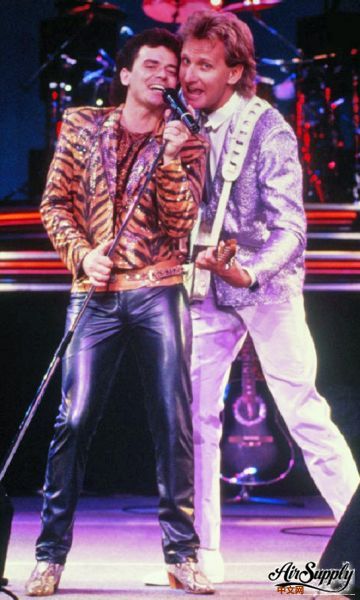
Russell hoped to record a solo album, which he planned to start after the release of the next Air Supply album. “I’m in the process of starting inquiring about doing a solo album,” said Russell. “I believe our audience, bless ‘em, will take just as much interest in our individual pursuits as in Air Supply. I think this will give us a new mental lease on life to come back next March and do another album. One of my ultimate ambitions is to return to acting. But I would have to take a lot of time off. I’d have to take acting lessons. I’d have to throw myself into it one hundred percent. I don’t want to be another singer in a rock and roll band who decided he could act. I don’t say because I’ve been successful in one field I could necessarily be successful in another.”
The second single, ‘The Power Of Love,’ was released in August. Arista hoped the song would propel the album up the charts, the same way ‘All Out Of Love’ did with the ‘Lost In Love’ album. Air Supply was still considered one of the heavyweights in the Arista lineup, but other artists under the label were having much better results in 1985. Whitney Houston, Billy Ocean and Aretha Franklin were selling millions of albums, and were pushing Air Supply off their pedestal.
Times were most certainly changing. Sales of ‘Air Supply’ plunged in its second month, and was the bands first album with Arista to not reach platinum. It peaked on Billboard at #26 on July 20, and went gold in Canada, Japan and the States. Quite an accomplishment for many bands, but for Air Supply it was a big disappointment. They were, after all, called one of the top bands of the 80s by Billboard. “I think our fans were disappointed because it was a departure for us,” said Graham. “There weren’t as many ballads. I also think ‘Power Of Love‘ would have been a monster hit if it had been the first single released. The record company’s timing was off.”
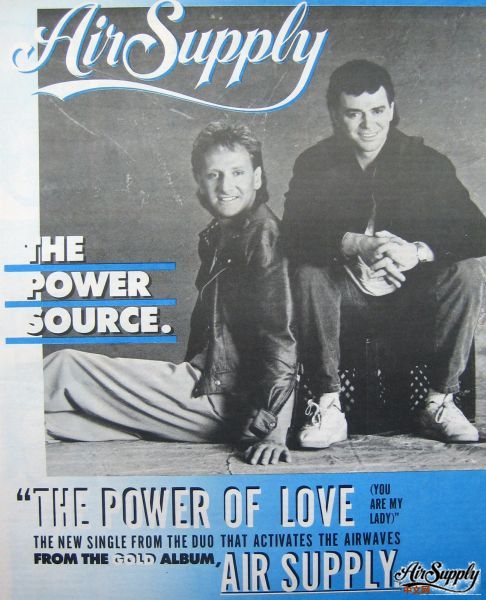
Contrary to popular belief, Air Supply were not first to release ‘The Power Of Love.’ Jennifer Rush co-wrote the song in 1984 and released it as a single later that same year for CBS in Germany. It was the fourth single off her 1984 self titled album, and it peaked at #9 on the German charts in March, 1985.
CBS London President, Paul Russell, had heard Jennifer Rush perform at a CBS Records convention in Hawaii in 1984, and this convinced him to release ‘The Power Of Love’ in the U.K. It debuted at #97, but after Rush performed it on the popular TV show Top of the Pops, it quickly jumped to #1, and stayed there for five weeks. It became Britain’s best selling single ever by a female singer.
Peter Collins got a copy of ‘The Power Of Love’ while Air Supply was in England in the dead of winter. “We went to England to do the album,” said Russell. “Peter called me at two in the morning after we were done at the studio and I was back at my apartment. Peter said, ‘I just found this song that was a big hit for this woman called Jennifer Rush. I’ve got to come over right away so I can play it for you.’ I thought it was spectacular. So I called Graham and told him this was going to be one of the biggest things we ever record. I loved the arrangement, the vocals, just everything about it.”
Jennifer Rush was particularly hurt that her version was covered by Air Supply because she hoped to release the song in America herself. CBS had held off releasing her version in America because they felt the song was too European sounding. After Air Supply released it in North America, Rush released her own version on a much wider scale. Her song reached #1 in Ireland, New Zealand, Australia, Norway, Austria and South Africa. “It was fabulous,” said Rush. “I loved watching the money come rolling in. I could sit back and do nothing for the rest of my life, but I wanted more success and better records. I wanted everything I did to be as popular as ‘The Power of Love.’”
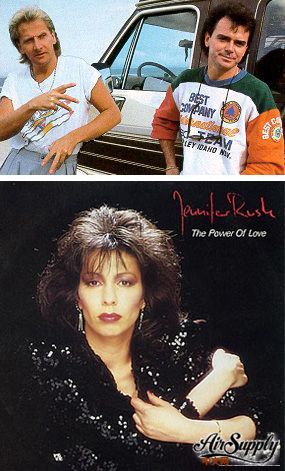
It was disappointing for Air Supply when ‘The Power Of Love’ peaked at #68 on Billboard. The song had all the elements of a major hit; outstanding vocal from Russell, powerful and catchy bassline from Don Cromwell. There are many who beleive that it underachieved because it was poorly edited by Arista, and it shared the same title as the Huey Lewis #1 hit, which debuted on radio a month before. Arista had released Air Supply’s single one month too late. Clive Davis and everyone in the band knew right away that their timing was off. “We were in New Jersey,” recalls Don Cromwell, “and I got a call in my room from the tour manager saying, ‘DC turn on your radio quickly!’ It was Huey Lewis singing ‘The Power Of Love.’ The same frickin’ title!”
“For some reason, Arista cut out the middle section of the song for radio,” said Russell. “We got into quite an argument. It was like taking the middle out of ‘Marking Love Out Of Nothing At All.’ It didn’t make any sense, and that was the first time that radio in the U.S. turned on us. They said it was not up to their standards, and that really devastated me.”
Jennifer Rush later said she felt gratified when Air Supply failed to crack the U.S. Top 40, because it allowed her to release her own version in North America in January of 1986. Her song went to #1 in Canada, but stalled at #57 in the U.S. Laura Branigan recorded and released ‘The Power of Love’ in October, 1987. Her version had some success in the U.S. reaching #26 on Billboard, but it failed to make a splash internationally. The Jennifer Rush version had already saturated those markets. ‘The Power Of Love’ experienced its most success when Canadian singer, Celine Dion, recorded it for her 1993 album titled, ‘The Colour Of My Love.’ Her version was #1 in the U.S., Canada and Australia, and Top 10 in many countries around the world.
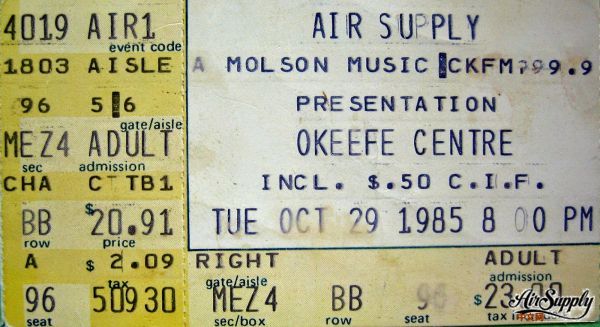
Air Supply’s 1984 performance at Sun City in South Africa created trouble for the band after they were targeted by an anti-apartheid group based in Toronto, Canada, called the Biko-Malcolm-Rodney coalition. The coalition was part of the Black Music Association (BMA) who worked on the cultural boycott of South Africa and apartheid, and they demonstrated against artists who visited and performed in South Africa. A United Nations-backed boycott of South Africa failed because the country was prepared to pay huge sums of money to attract the very best musicians to perform at Sun City’s massive auditorium. The BMA gave awards to artists who turned down lucrative contracts to perform in the region, which included such artists as Roberta Flack, Dan Hill and The Mighty Sparrow. Before Air Supply performed at the O’Keefe Centre in Toronto on October 29, 1985, the Biko-Malcolm-Rodney coalition demanded a boycott of the concert. According to coalition spokesperson, Norman Otis Richmond, “The Toronto chapter was the most outspoken chapter when it came to the question of South African apartheid.” Air Supply road manager, Bernie Boyle, issued a formal apology for the bands performance in South Africa, including a letter of apology that was sent to the coalition headquarters in Toronto. Other artists to issue formal apologies included Kenny Rogers, Tina Turner, Barry Manilow, Queen and Elton John. The coalition was instrumental in Air Supply’s decision to not further play in South Africa.
Despite the protest hassles, and having to wake up at 6 A.M. to show their passports upon arrival at the Canadian border, Air Supply put on a spectacular show before a sold-out crowd at the Toronto O’Keefe Centre. Even the skeptical media could not ignore the low-key hysteria that Air Supply aroused in their fans:
All night long the Australian duo were the targets of roses, teddy bears, hastily scribbled notes and shy kisses. The screams were terse. When told to return to their seats, the girls did so obediently. Even the one girl who fainted did so quietly. The whole audience seemed to be made up of Grade 8 honour students. What they saw and heard was something resembling a cartoon version of a Barry Manilow concert. Graham Russell’s songs, which are pleasant and innocuous enough when taken in small doses, too easily displayed their formulaic structure when strung together. Paul McCartney would call them silly little love songs, be he probably wouldn’t have dressed them up with so much gloss (two synthesizers, two guitars, more lights than Niagara Falls on an August night). Hitchcock did display a strong, clear voice and oodles of charm, however, both of which are guaranteed to keep this band at or near the top of the singles charts. But oddly enough, perhaps the finest single moment of the evening came when Hitchcock left the stage to the more serious Russell. Using just the two synthesizers (and a ton of echo) for support, Russell sang a song called ‘Don’t Be Afraid,’ which was reminiscent of ex-Zombie Colin Blunstone at his breathless best. - Alan Niester, The Globe and Mail
Air Supply embarked on a major tour of Japan from September 10 to October 3 as part of the Power of Love Tour. They played 11 cities including Tokyo, Sapporo and Hiroshima. They also performed in Hong Kong. Air Supply prepared for the trip by doing a live satellite broadcast, from Salt Lake City on August 21st, of the the album’s first single, ‘Just As I Am.’ It was shown live on the Japanese TV show Yoruni Hit Studio. The broadcast was done at 5:30 A.M. Mountain Time in order for it be telecast to the show’s 20 million viewers during Japanese prime time.
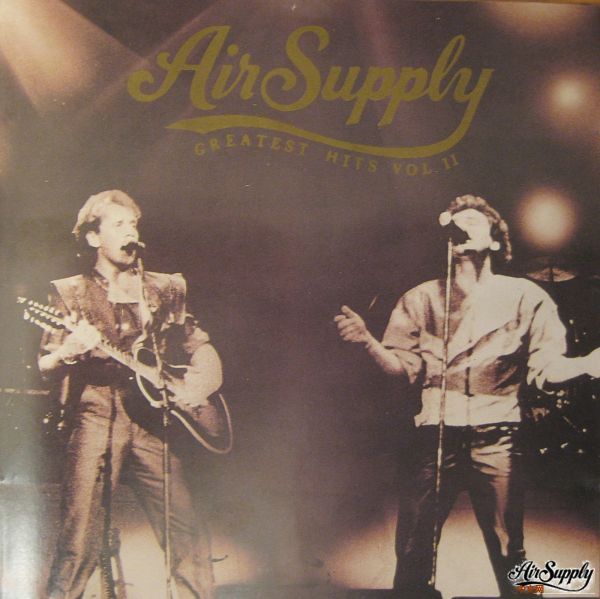
‘Greatest Hits Vol. 2’
With both the album and ‘The Power Of Love’ single still riding the charts in Japan, Nippon Phonogram released ‘Greatest Hits Vol. 2.’ It included songs from the previous hits album, but also some lesser known tracks such as ‘American Hearts’ and ‘One Step Closer.’ ‘Greatest Hits Vol. 2’ reached gold status (25,000 units) in Hong Kong, and was reissued on CD in 1989 by BMG Pacific Ltd.
Russell believed Air Supply was still popular in Asia because they maintained a strong relationship with music retailers. “Retailers can be very creative, and can affect sales in a big way,” he said. “Buying records is not like going to the grocery store because you need bread. If you’re not at the front of the rack, or if your display isn’t as seductive as the next guy’s, when a customer only has seven or eight dollars to spend on a record, you’re going to lose a sale. In Japan, the competition between retailers for the most attractive display for us has become an Air Supply institution. And it’s the result of having the best possible relationship with the retailer and the record company. Having a good relationship with the stores is as important as the relationship between any of the other people involved in your business.”
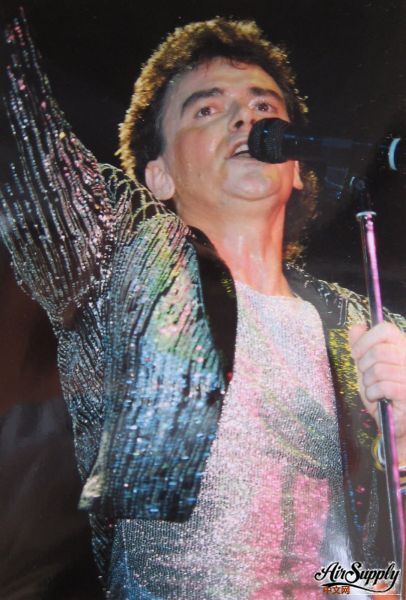
Following in Graham’s footsteps, Russell moved to L.A. to live with his girlfriend Paula. The move was necessary because most of the band’s operations were now based in the U.S. “From 1980, we have toured North America all the time,” said Russell. “Our MO was to make an album in Australia over Christmas, and then come back to the U.S. in February and start touring. We would not get back home to Australia until October or November. Plus we would go back to Australia three or four times a year. But everything was pushing us back to the U.S., and it seemed obvious that we would have to move to Los Angeles specifically. We were doing every TV show during these years, and if you are in Australia you’re not accessible for them, as they can’t call you up and ask if you can be there in two days. Plus, our management was in Los Angeles, our record company was in New York with an office in L.A. I do much the same here as I did in Sydney. I lead a real quiet life when I’m not on the road or in the recording studio. I like to go out and eat in restaurants, and I also love to stay home and watch a lot of television. And see my girlfriend as much as I can. We’re still proud of being from Australia. I mean, we’re not taking up citizenship here in America.” Russell and Paula hoped to get married in early 1986. “We took the risk of leaving Australia and leaving what we had behind,” said Graham. “We knew that once we left we could not come back but that was the risk we wanted to to take.”
|
|